About This Program
This program aims to develop anti-CD11b therapeutic monoclonal antibody for immuno-oncology.
CD11b can mediate macrophage adhesion, migration, chemotaxis, and accumulation during the inflammatory processes. Scientists found CD11b contributes bone marrow cells development into a subtype of M1 macrophages, which a factor to prevent tumor growth. However, data have also shown that cancer cells interference with the CD11b activity and can convert bone marrow cells into M2 macrophages. Instead of suppressing tumor growth, M2 macrophages worthen the process. Because integrin CD11b and its role in macrophage polarization, it is believed, yet not proved, this integrin regulates the immune response during tumor progression.
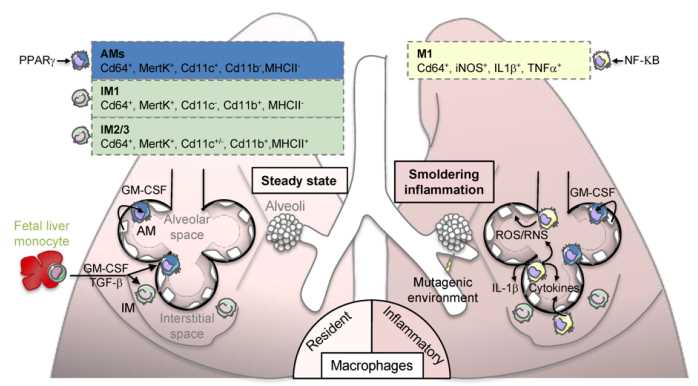 Fig.1 CD11bs mediated the T cells response and programmed cell death process toward tumor environment.4
Fig.1 CD11bs mediated the T cells response and programmed cell death process toward tumor environment.4
CD11b
CD11b belongs to the β2-integrin subfamily, which presenting on myeloid cells. The β2-integrin subfamily is a leukocyte-specific receptor composed of different alpha subunits, CD11a, CD11b, CD11c, and CD11d, and a common beta subunit, CD18. CD11b has been identified as a negative regulator of immunosuppression and a target for cancer immunotherapy. Rationale highlighted below:
-
Integrin CD11b does not work by regulating the recruitment of bone marrow cells to tumors but rather controls myeloid cell polarization and tumor growth.
-
CD11b, small molecule agonist, can promote the polarization of pro-inflammatory macrophages and is tested for its role to inhibit tumor growth in animal mouse and human cancer models.
-
CD11b antibody is capable of disrupting myeloperoxidase(MPO) in CD11b-binding myeloid cells, hence, preventing MPO-mediated inhibition of neutrophil apoptosis.
CD11b in Cancer Studies
Here are some published data about CD11b working as a potential target for cancer immunotherapy.
-
Anti-CD11b antibody injection completely abrogated Met-induced growth inhibition of K7M2neo.
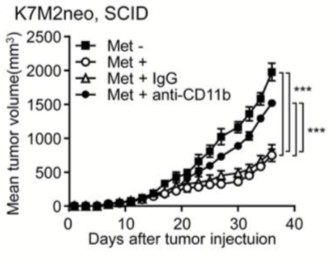 Fig.2 BALB/c SCID mice inoculated with K7M2neo cells were untreated or administered Met on day 7 and injected with the indicated antibodies from days 19 to 34 at 5-day intervals.1
Fig.2 BALB/c SCID mice inoculated with K7M2neo cells were untreated or administered Met on day 7 and injected with the indicated antibodies from days 19 to 34 at 5-day intervals.1
-
CD11b+GR-1+ MDSC mediates the cancer-promoting effects of the lung metastatic niche.
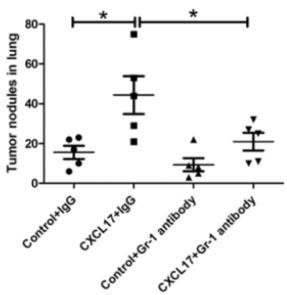 Fig.3 CD11b+Gr-1+ myeloid cells in lungs metastatic niche promote cancer cell colonization.2
Fig.3 CD11b+Gr-1+ myeloid cells in lungs metastatic niche promote cancer cell colonization.2
-
The CD11b antibody prevents cell migration and manifests anti-tumorigenic effects in vivo.
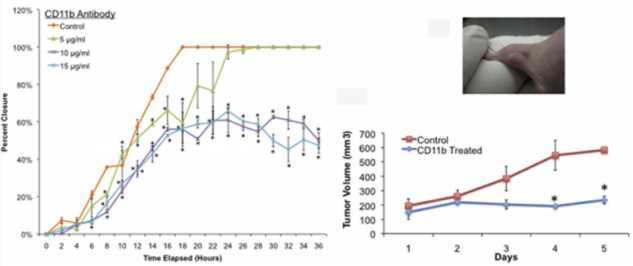 Fig. 4. The anti-tumorigenic effect of CD11b antibody was assessed in a female athymic nude mouse xenograft model.3
Fig. 4. The anti-tumorigenic effect of CD11b antibody was assessed in a female athymic nude mouse xenograft model.3
Ongoing Clinical Trials
-
Currently, several anti- CD11b antibodies are being evaluated in clinical trials after successful testing in animal models. However, almost all anti-CD11b drugs focus on inhibiting the activity of CD11b did not produce desired effects in these testings. Further study is definitely needed.
-
In this case, CD11b can still work as a compelling target for cancer immunotherapy. In an effort to optimally leverage CD11b-mediated immune response, our next generation of CD11b targeting treatment attempts to develop the agonist agent to fully reactivated CD11b.
Program Planning and Management
We have extensive knowledge of end-to-end program development. For each program, we are committed to delivering the finalized program to our clients within 1.5 years before entering the IND stage.
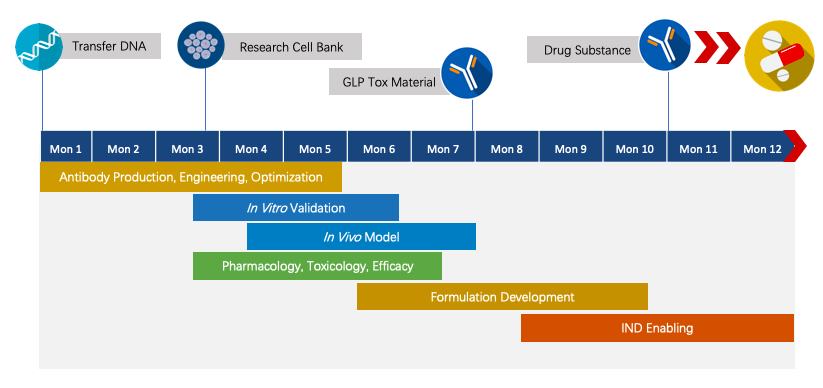 Fig.5 Project pipeline management of therapeutic monoclonal antibody.
Fig.5 Project pipeline management of therapeutic monoclonal antibody.
Cooperation
Creative Biolabs is looking for potential partners (include but not limit to major pharma or biotech firms) to develop anti-CD11b therapeutic monoclonal antibody program together. Our scientists are dedicated to bringing years of valuable experience to our partner and achieve a meaningful partnership. For any partners interest in our Next-IO™ programs, Creative Biolabs welcomes collaboration.
Here are two ways for your choice, and please contact us for more details.
1) Collaborate with us and co-develop the programs from the discovery phase to IND enabling. Costs will be shared.
2) Become a licensed candidate for our programs.
With our quality control protocol and knowledge of global regulatory requirements, we can help our partners advance their programs with more chance to succeed. Look forward to cooperating with you in the near future.


 Fig.1 CD11bs mediated the T cells response and programmed cell death process toward tumor environment.4
Fig.1 CD11bs mediated the T cells response and programmed cell death process toward tumor environment.4
 Fig.2 BALB/c SCID mice inoculated with K7M2neo cells were untreated or administered Met on day 7 and injected with the indicated antibodies from days 19 to 34 at 5-day intervals.1
Fig.2 BALB/c SCID mice inoculated with K7M2neo cells were untreated or administered Met on day 7 and injected with the indicated antibodies from days 19 to 34 at 5-day intervals.1
 Fig.3 CD11b+Gr-1+ myeloid cells in lungs metastatic niche promote cancer cell colonization.2
Fig.3 CD11b+Gr-1+ myeloid cells in lungs metastatic niche promote cancer cell colonization.2
 Fig. 4. The anti-tumorigenic effect of CD11b antibody was assessed in a female athymic nude mouse xenograft model.3
Fig. 4. The anti-tumorigenic effect of CD11b antibody was assessed in a female athymic nude mouse xenograft model.3
 Fig.5 Project pipeline management of therapeutic monoclonal antibody.
Fig.5 Project pipeline management of therapeutic monoclonal antibody.
 Download our brochure
Download our brochure